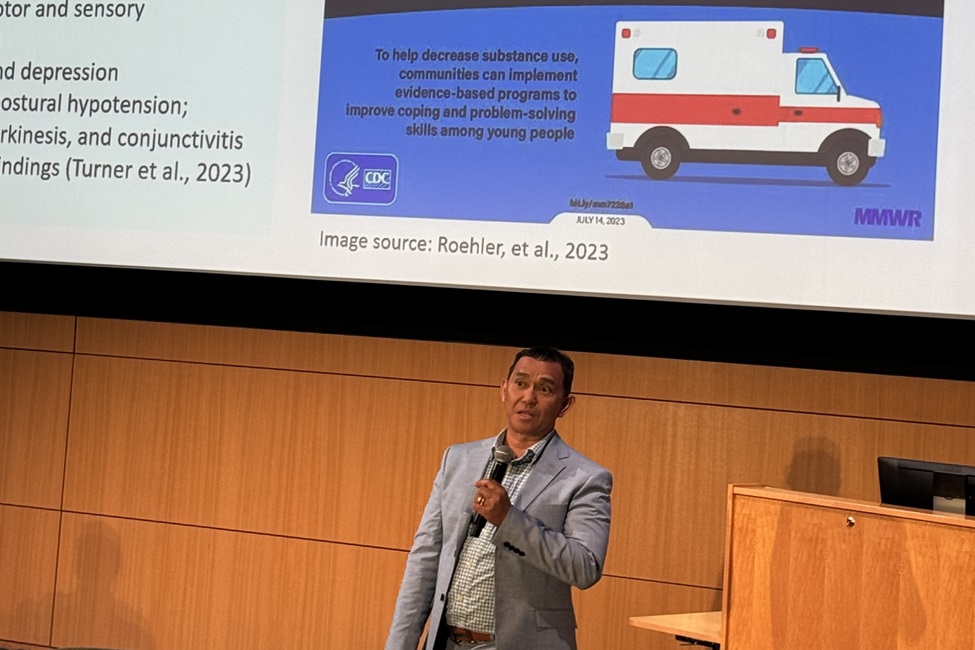NAM Selects FAU for Substance Use, Opioid Crises Collaborative

The National Academy of Medicine Action Collaborative has selected 16 pilot sites from across the nation to participate in the Implementation Pilot Project. FAU was selected as one of the implementation pilot sites, spearheaded by the Christine E. Lynn College of Nursing.
As of 2024, approximately 2.7 million Americans aged 12 and older were estimated to have misused prescription opioids in the past year. Moreover, alcohol, cannabis, cocaine, methamphetamines, among other substances, reflect a complex landscape that requires ongoing efforts aimed at prevention, treatment and policy changes to address the various issues associated with each substance.
Florida Atlantic University was recently selected to participate in the National Academy of Medicine’s (NAM) Action Collaborative on Combatting Substance Use Opioid Crises Core Competency Implementation Pilot Project. To improve coordination and accelerate the pace of change, NAM partnered with more than 80 organizations to form the collaborative. This initiative brings together key stakeholders from the public, private and nonprofit sectors to collaboratively address critical issues posed by addiction.
Armiel Suriaga, Ph.D., an assistant professor in FAU’s Christine E. Lynn College of Nursing, will serve as the project lead. FAU joins other implementation sites across the United States in working toward advancing substance use care, workforce competency, and interprofessional education and practice by implementing the Action Collaborative’s 3Cs Framework for Pain and Unhealthy Substance Use, released in 2022.
The 3Cs Framework aims to set a standard for the minimum level of competence in pain management and substance use care expected from all health professionals to address professional practice gaps while strengthening the delivery of coordinated, interprofessional, high-quality and person-centered care.
The NAM Action Collaborative has selected 16 pilot sites from across the nation to participate in the Implementation Pilot Project. FAU was selected as one of the implementation pilot sites. The project focuses on implementing the selected 3 Cs framework, such as core knowledge domains with competencies of foundational and applied knowledge on pain and unhealthy substance use, such as opioids, with nursing students and medical students, in collaboration with the FAU Office of Interprofessional Education and Practice (IPE&P) within the Office of the Provost.
“Being selected to address substance use by the National Academy of Medicine is more than just an honor, it’s a pivotal chance to drive transformative change,” said Patricia Liehr, Ph.D., interim dean, FAU Christine E. Lynn College of Nursing. “The Action Collaborative is committed to proactively advancing structural solutions through comprehensive, multi-sector strategies aimed at reducing substance misuse and enhancing outcomes for those impacted by addiction. This crisis cannot be solved by any single entity alone – no organization, government agency, or sector has all the answers. It is through our collective effort that we can tackle this complex public health issue and forge a healthier, safer future for individuals, families and communities.”
The NAM Action Collaborative’s Implementation Pilot Project seeks to gain insights into the varied applications of the 3Cs Framework and the respective implementation processes. The learnings from this project will offer insight into the feasibility and utility of implementing the 3Cs Framework to improve health professional competency across the learning continuum and a diversity of interprofessional education and practice settings.
Through participation in the implementation pilot, FAU will help inform and shape the future of health professions education policy and practice. As part of the implementation pilot, the project team will engage in a dynamic learning community where they will share insights and best practices while fostering relationships and connections with other sites and Action Collaborative members. The team also will travel to Washington, D.C. to participate in a final knowledge sharing convening that will bring together representatives from the pilot sites and leaders across health professions education and training, health care delivery and policy.
Other members of the FAU project team include Ophelia Empleo-Frazier, GNP-BC, CDP, Yale School of Nursing; Ruth M. Tappen, Ed.D., Christine E. Lynn Eminent Scholar and Professor, FAU Christine E. Lynn College of Nursing; Terry Eggenberger, Ph.D., a professor and executive director of the FAU IPE&P; George R. Luck, M.D., interim associate program director, hospice and palliative medicine and associate professor of anesthesia, FAU Schmidt College of Medicine; Reynel Lavandera, Ph.D., associate professor and associate director of IPE&P for nursing; and Aloha Balza Montes, assistant IPE&P director, and FAU Ph.D. candidate.
“Addressing substance use in the context of pain and health care requires a unified effort because no single perspective can encompass the complexity of these issues,” said Suriaga. “Collaboration among researchers, clinicians, students and others will enable us to develop comprehensive solutions that address both the physiological and psychological dimensions of substance use, ultimately leading to more effective and compassionate care for our patients.”

Armiel Suriaga, Ph.D., an assistant professor in FAU’s Christine E. Lynn College of Nursing, will serve as the project lead.
-FAU-






